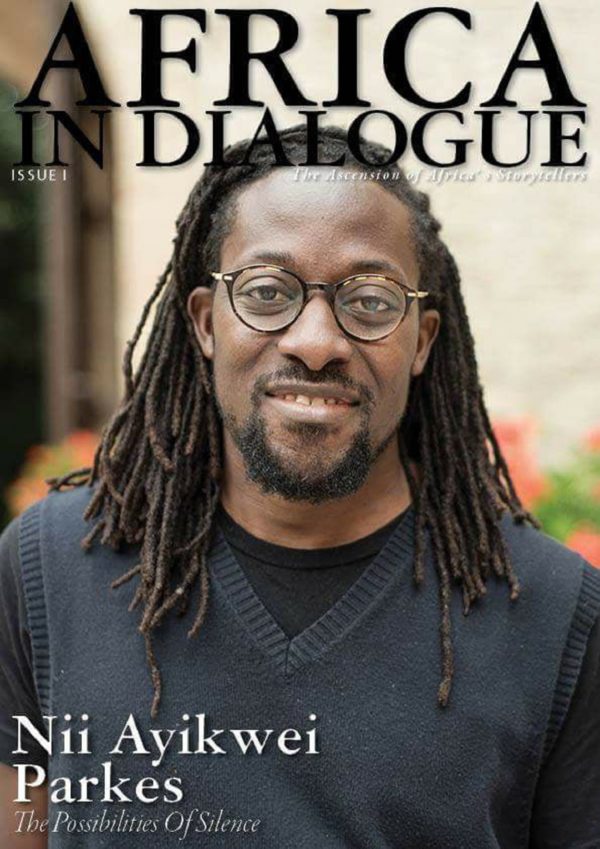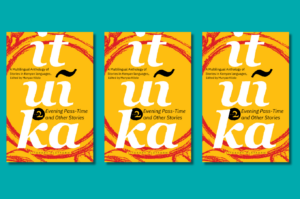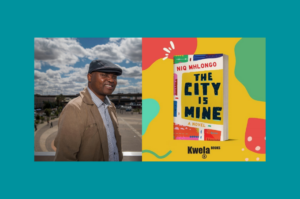Africa in Dialogue‘s hotly anticipated first issue just dropped, and it is a visually appealing one. The colourful 55-page release collects eleven revealing interviews of writers, filmmakers and artists conducted by writers, filmmakers and artists.
DOWNLOAD: Africa in Dialogue – First Issue
Guest-edited by Saraba co-founder and author of The Sound of Things to Come, Emmanuel Iduma, the issue has the Zimbabwean spoken word poet Mutsa Diana Shiripinda as Visual Director. The cover features the Ghanaian poet and novelist Nii Ayikwei Parkes, and the cover story, titled the “The Possibilities of Silence,” sees him and the magazine editor and filmmaker Gaamangwe Joy Mogami in a conversation.
Every other conversation is as beautifully titled. In “Untimely Meditations,” South Sudanese-Ugandan professor of literature, Taban Lo Liyong, is interviewed by the South Africa-based academic Paul Mason and Chimurenga editor Stacy Hardy. In “The Beauty of Salt,” Nigerian filmmaker and writer Umar Turaki discusses his film with the Brunel Prize-shortlisted Nigerian poet Kechi Nomu. In “Representative Literature,” Mozambican organizational strategist Sarah J Owusu is interviewed by the Kenyan-Swedish-Danish-Jamaican writer Nereya Otieno. In “Creating Responsibly,” Nigerian writer, digital marketer, and illustrator Justin Irabor is interviewed by Nigeria’s The Critic Challenge 2017 runner-up Lade Tawak. In “Motherfuckitude: The Naked Ones,” Ghanaian writer, poet, vocalist and spoken word artist Poetra Asantewa discusses her EP with Saraba editorial assistant and Awele Short Story Award finalist Kemi Falodun.
In “Beneath the Brown Rusted Roofs,” U.S.-based Nigerian academic Abimbola Adunni Adelakun is interviewed by Nigerian Lunaris Review founding editor and Parentheses Journal fiction editor Tolulope Oke. In “A Tributary in Servitude,” Association of Nigerian Authors (ANA) Prize-winning poet Servio Gbadamosi is interviewed by Nigerian BN Poetry Award finalist and Winepress Publishers editor Ajibola Tolase. In “Curating a Digital Archive of African Experiences,” Ghanaian documentary photographer and videographer Ernest Kodjo Ayikpah is interviewed by Zimbabwean The Mabvazuva Magazine founding editor Tariro Mushonga. In “Witchcraft Is a Very Nigerian Thing,” Nigerian Media Merit Award-winning journalist Sam Omatseye is interviewed by Nigeria’s Obinna Udenwe, author of Satans and Shaitans and Holy Sex. In “On Writing Women and Being a Feminist,” Wole Soyinka Prize- and Noma Award-winning novelist Sefi Atta is interviewed by U.S.-based Nigerian writer and journalist Ashley Okwuosa.
Here is Emmanuel Iduma’s guest editor’s note.
Letter From Editor
Do you know, have you read, the poet and novelist Anne Michaels? I’m thinking now of Correspondences, her 2013 book-length poem. It’s a book without a spine, unfolding like an accordion. You could think of it as a book without borders, in which a reader navigates the pages, as if somnambulant. The book is double-layered. On the first layer a poem unfolds from edge to edge, page by page. On the second layer, on the other side, a parallel poem unfolds—this time the words are selected from a range of books Michaels has loved, paired with illustrations by Bernice Eisenstein of the quoted writers.
You encounter this blurb on one side of the book:
not two to make one,
but two to make
the third,
just as a conversation can become
the third side of a page.
Consider this for a moment.
A dialogue hints at the possibility that ideas are always unfinished, constantly under revision. Our convictions, if they relate to creative work, and although we’d like to think of them as fixed, might rove when placed under scrutiny. It is as if, being believers, we are still in search of proof.
Think of it in another way. The word “conversation,” implies, if we play around with its letters, a “converse,” the converse of an idea; what lies behind yet exists in parallel, initially undiscerned and dormant, waiting to reflect meaning.
We did not seek these eleven dialogues to understand in full what the artists were thinking while making the work. All the dialogues relay in part, suggesting what occurs to the interviewee at the moment when the question was asked. The ideal interview pitches forward, for perhaps the artist might encounter a mystery in their work while responding to a question. Perhaps we should scramble for words that imply these dialogues as back-and-forth propositions.
Not two to make one, but two to make the third. I read these dialogues imagining myself as that third, the reader who listened to, and mediated between two. And I hope we have managed to present to other readers—each arriving at spare, private times—an intimate space for listening.
I send you an embrace.
Emmanuel Iduma.
Congratulations to Gaamangwe Mogami, Emmanuel Iduma, Mutsa Diana Shiripinda, and the team at Africa in Dialogue: WordPress Specialist Chelsea Haith, Literary Researcher/Reader Ejiofor Ugwu, Social Media Visual Director Alicia Connolly, Instagram Manager Miriam Watsemba, Twitter Manager Kearoma Mosata, and Pinterest Manager Awetse Motlhabane. And to the artists in dialogue. This e-book just rose to number one on our to-read list.










COMMENTS -
Reader Interactions